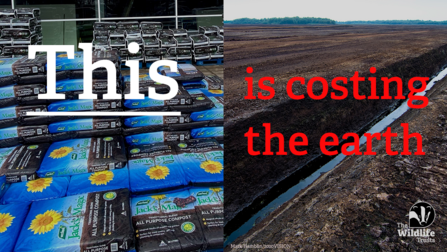Earlier this year, the Government asked the public to respond to a consultation on ending the use of peat in domestic horticulture by 2024. The Wildlife Trusts believe that this is a step in the right direction, but there is no reason to wait when 80% of our vital peatlands are degraded. In fact, a new report showed that waiting another two years to ban peat use could add more than 1.5 million tonnes of CO2 to our atmosphere – roughly equivalent to the annual greenhouse gas emissions of more than 214,000 UK residents.
So, what are we waiting for? Many people make fantastic peat-free composts at home from leaf mould, kitchen, and green garden waste. Other alternatives include bark, wood fibre, bracken, and even sheep’s wool.

